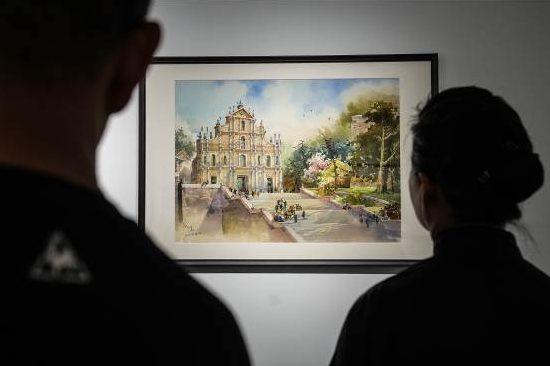Profile
Benjamin David Serres, American, born in 1985, arrived in Langfang, Hebei in 2012, and is currently a foreign English teacher at North China Institute of Aerospace Engineering. In 2020, he received the Yan Zhao Friendship Award.
Reading Tips
This year, Benjamin David Serres, a foreign teacher at North China Institute of Aerospace Engineering, has been in Hebei for ten years.
Benjamin sincerely enjoys being an "English teacher". In 2012, on the advice of a friend, he made the decision to come to China and successfully found a satisfactory job in Langfang, Hebei. Over the past decade, Benjamin has worked and started a family in Langfang, experiencing and documenting the changes in Langfang and Hebei in his daily life and work.
Benjamin: I really enjoy teaching. I majored in English when I was in college in the United States, but after graduating in 2008, I found that there were too many English teachers in America, and the salary was very low. So I taught myself programming and worked as a programmer at a mechanical engineering company in Washington. But I didn't like being an "IT guy" at all, it was too tiring and busy.
What I liked most was being an English teacher. At that time, I volunteered at a non-profit organization that offered free English classes to adults from China, South Korea, and other countries, every Wednesday.
At that time, I was chatting with a friend who had been working in China since 2007, and he told me that China needed English teachers. So, why not give it a try?
Reporter: How did you feel when you heard your friend's advice?
Benjamin: Although I had never been to China before, I had a good impression of it. When I was seven or eight years old, my mom bought me a book introducing the natural scenery and cultural landscape of China, and I really liked it, so I longed for China. I also loved watching Jackie Chan movies when I was a child, especially Police Story. At that time, I thought, "Oh, China is cool."
In 2012, I made up my mind to come to China. My friend was a foreign teacher at a university in Baoding, but they didn't need any more foreign teachers at that time. Fortunately, I heard that Langfang Normal University was recruiting foreign teachers, and Langfang is very close to Beijing, so it was perfect.
I had eaten Chinese food in the United States, but it was American-style Chinese food, not very tasty. But when I came to Langfang, I found that Chinese food was delicious, especially tomato and scrambled eggs. So I liked it here even more.
Reporter: It is said that students really like you because you can play with them and your classes are interesting.
Benjamin: That's probably true. I put a lot of effort into preparing my lessons. For every 10-minute class, I need to prepare for 120 minutes beforehand. I have to make PowerPoint slides, read books, and design game scenarios, there is a lot of work to do.
I focus on practical English in my teaching, so I often pre-design some scenarios for everyone to perform like a play, which is both fun and helps them to apply what they have learned. These designs are mostly inspired by Chinese sketches. I have watched many sketches, and I especially like Jia Ling and enjoy watching her various TV programs. I also love popular comedy movies like Hi, Mom and The Wandering Earth.
Not only do we perform plays, but I also have students give speeches in English every class. I am happy to see that they are all confident and good at presenting themselves, our classroom atmosphere is always relaxed and harmonious. When I first arrived at North China Institute of Aerospace Engineering in 2013, I used to play football and basketball with seven male students every day, and I also taught them American football while they taught me Chinese. We still keep in touch through WeChat now.
Reporter: I heard that besides teaching at school, you have been volunteering to teach as well since you came to Langfang?
Benjamin: Yes, as soon as I arrived in Langfang, I set up an English corner. At first, we held it at a friend's house and taught English to people living nearby for free. Three people came the first time, but more and more came later, and by 2017, there were 75 people. Because there were too many people, we moved the "classroom" to a friend's auto repair shop.
Later, I met my wife here. She was also learning English at the time, and the moment I saw her, I was instantly smitten.
I think if you want to keep yourself physically and mentally healthy, you must do charity work. Of course, donating blood, protecting the environment, and so on are all good, but my way of doing charity is to teach everyone English for free.
Growing Sense of Belonging in Hebei
Reporter: I understand that when the epidemic broke out in Wuhan, you once called on your foreign friends to cheer for Wuhan and China, and then edited it into a video and posted it online. Why did you want to do this?
Benjamin: When I saw the situation in Wuhan on TV, I felt very sad and wanted to do something. My wife suggested that I mobilize my friends and family in the United States to each record a sentence to express our encouragement and support for the Chinese people.
Originally, I thought I could only find 30 friends and family to record videos, but after this initiative was posted online by my friends, it received responses from netizens around the world. Over 300 netizens from countries such as the United States, Russia, the Philippines, and Indonesia sent videos, and even after the video was made, blessings from all over the world continued to pour in.
The reason I felt this was necessary was because when I came to China, I found that everyone was very friendly. Before getting married, I visited many places during summer vacations, such as Sanya, Fujian, Putian, and Pinggu in Beijing, and almost always stayed at friends' houses, where they treated me like family. After getting married, I mostly followed my wife back to Northeast China, and I am sincerely grateful for the friendliness of the Chinese people. In Langfang, I learned Tai Chi for free from a master in the park for three years. Although he couldn't speak English, he taught me hand in hand and adjusted my movements.
It is because of this gratitude for these good experiences that when the Chinese people encounter difficulties, I also want to do whatever I can for them.
Reporter: You've been in Hebei, in Langfang, for a whole ten years. Do you think Langfang has changed a lot?
Benjamin: When I first came to Langfang, there was basically nothing west of Xihuan Road, but now it's very bustling. Now the development zone in Langfang has developed very well, but back then it was quite desolate.
My wife likes to go to Sanlitun in Beijing, and we often take the high-speed train to Beijing for shopping. But when I first came in 2012, there were only two trains from Langfang to Beijing, one in the morning and one in the evening. Now, there's almost a high-speed train every 30 minutes.
Reporter: Over the past ten years, you've been working in the education industry. Have you paid special attention to the changes in education in Hebei?
Benjamin: Yes, I have. I've also heard discussions from family members. Children have more time to develop their interests and hobbies in the future. I have my own baby, and we will probably live in Langfang for a long time in the future. The positive changes in education in Hebei also give me confidence in my baby's future education.
Moreover, I feel that there has been a significant increase in the investment in education in Hebei. When I arrived at North China Institute of Aerospace Engineering in 2013, classes were mainly held in the old campus. At that time, I taught in Building 4 for the Mechanical Engineering students. It was an old building built in 1978, with old-fashioned desktop computers in the classrooms. Every time they were turned on, there was a "dong" sound, and when you inserted a CD, the response was particularly slow. Some of my classes are also held in the current East Campus, where the teaching conditions are much better. I heard that they will soon replace another batch of new teaching equipment here, and the blackboards all have screens. We also heard that the school is promoting the construction of a new campus in Gu'an, which is even larger. I'm looking forward to it.
Reporter: I understand that you were awarded the Outstanding Foreign Expert of Hebei Province in 2014 and the Yan Zhao Friendship Award in 2020.
Benjamin: Yes, Hebei values foreign experts a lot. Just a few days ago, I received a notification from the Foreign Expert Management Office of the Hebei Provincial Department of Science and Technology about participating in the 2022 Beijing-Tianjin-Hebei High-end Foreign Expert Academic Exchange Activities. This event will be held in Tianjin, but because my baby is still too young and we lack help at home, I won't be able to participate this year.
In fact, I am invited to participate in such events every year, which allows me to personally experience the development of Hebei and China. In 2019, the province organized us to go to Guizhou to visit the development of big data in Guizhou, and we also went to the Miao Village and listened to their poverty alleviation stories.
At our North China Institute of Aerospace Engineering, the school is constantly improving the treatment of foreign teachers, including salary, insurance, and training. The International Cooperation and Exchange Center where I work organizes departmental training every year, including cultural training, which allows us to understand Hebei culture, Langfang culture, and love our second hometown even more.
In Hebei, the lives of foreigners are becoming more and more convenient, and there are more and more foreigners in Hebei. Take Langfang, for example. When I first came to Langfang, including myself, there were only three permanent foreigners, but by 2019, there were over 3,000 foreigners in Langfang. Our sense of belonging in Hebei is getting stronger and stronger.
Events
More+-

3rd Annual Juneteenth Celebration in Shanghai
-

Where to Watch Euro 2024 in Shanghai
-

111 dragon boats, 19 foreign teams! The Guangzhou international dragon boat invitation tournament will be held on June 16
-

Visit Prince Kung's Palace and Explore 'Macao World Heritage'!
-

Summer comes with loads of nightlife fun!



 京公网安备
京公网安备